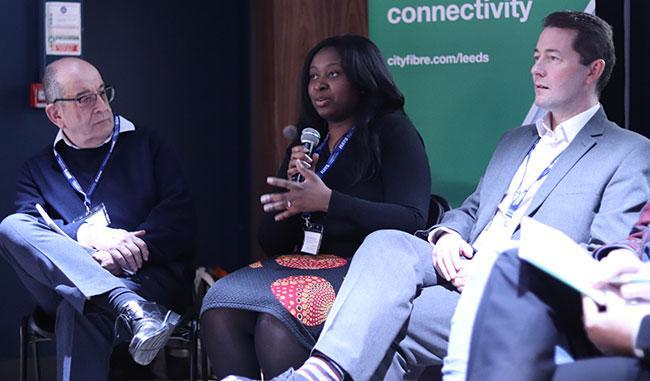Varaidzo Mapunde
BSc (Hons) Technology and Management Sciences, MSc Leadership Management and Change in Health and Social Care
- Programme Manager at National Institute for Health Research
- Supports the development and evaluation of medical technologies for surgery
- Chose Bradford as the course was highly recommended by work colleagues

Current role
"I am a Programme Manager and manage a research programme grant from the National Institute for Health Research that supports the development and evaluation of medical technologies for surgery.
"The best aspects of the job include variety (no two technologies are the same and I get to play with them before the rest of the world!), the autonomy and knowing that I am contributing to better medical treatments for everyone. There aren’t really any downsides that would make me think about not working here, but medical technology development requires a lot of funding and there is a lot of disappointment, especially when we have brilliant technology but no funding to take it through.
"After an unsuccessful interview for a Research Coordinator position following my first graduation, I was offered a part-time Systematic Reviewer post as the successful candidate had declined. The employer was impressed by my transferable skills and offered me this post as an opportunity to gain NHS experience in a supportive environment. I accepted this post as I was tired of watching daytime TV and this was before broadband internet was a thing!
"Despite having no knowledge or experience of being a systematic reviewer, my manager supported me and made sure training was available. When the new EU clinical trials regulations were translated in the UK, another post became available which I applied for. This was a new post in most NHS organisations and I took the opportunity to increase my knowledge in this area. One thing led to another and the rest is history."
"I found out about my current job from the previous post holder and they thought it would be a good fit for me given my experience. I was hesitant at first as I did not know anything about medical technology development as all my experience had been within pharmaceutical clinical trials. However, given that I started my career by taking on the unfamiliar and learning something new, I decided to give it a shot as I had nothing to lose."
In the field of research management, you really need to have work experience or a good understanding of the research area.
Choosing my sector
"I chose to work in MedTech because it is one area of healthcare where it is easy to visualise the impact a technology will have on the patient. Having also worked with pharmaceutical companies, I was aware of the differences between pharmaceutical and MedTech research and I wanted to implement successful strategies that had worked from the pharmaceutical sector to the MedTech one.
"I cannot say I have had a single inspiration, but I have definitely worked with inspirational managers who have trusted in my abilities and potential and given me the freedom to operate.
"My role really hasn’t changed with the impact of Covid-19, as most of what I do can be conducted at home. If anything, we actually had more work coming through so for me it was business as usual without the commute."

Experience at Bradford
"My father had actually wanted me to study Business Management but I wasn’t so sure about my employment prospects in a field I really wasn’t passionate about.
"As I did my A-levels in Zimbabwe and only found out that my father had been relocated to Stockholm at the end of the year, I requested brochures from universities in close proximity to an airport where I could get flights to Stockholm for the holidays.
"I happened to flick through the Bradford prospectus and there was a Technology and Management course on offer which I had not come across at other universities. I knew this was the right degree for me as there were elements of engineering and materials science and this drew me in.
"I chose to continue my studies at Bradford, as I was working in Leeds at that time so it was close to work and home. The other reason was that the Bradford course was highly recommended by current and former work colleagues, even though the same course was available in other locations that were also easily accessible to me.
"I was always interested in studying at postgraduate level but waited until I had decided what my long-term career path would be. I did not want to do a postgraduate course just because it was available and it had to enhance my skills as well.
"I enjoyed my Bradford experience and I was at the halls of residence which meant I had access to the library, computer rooms and the Students' Union. The staff were always on hand to support international students and I cannot say I had a bad experience during my studies."
My choice of Bradford degrees meant that I developed a good set of transferable skills and a problem-solving mindset which enabled me to always find a way around obstacles. Without this 'can do' attitude, I probably would have never accepted my initial job as a systematic reviewer which is solely responsible for where I am now.
Advice for students
"My advice to students considering postgraduate study is to not rush into it. Take your time to find out about where you want your career to go and to figure out what skills you want to sharpen.
"You want a postgraduate qualification that can carry you and one that you can make use of in the sectors that are open to you.
"My advice for preparing for the job market is to be prepared for a lot of rejections. It is very competitive out there and you need to develop a thick skin. Be prepared to start from the bottom even if you have all the qualifications and sometimes it is more important to get your foot in the door than wait for the perfect job.
"Before I gained my Master's degree I was line managing people with PhD's, so don’t use the qualification as your only lever. You definitely need to add appropriate work experience to rise to the top."
Finding work
"When I graduated I started looking for jobs in academia and the engineering sector, as I really wanted to carry on with the research element of my course as that is what I enjoyed the most.
"My approach was to personalise my CV for each job and to search for jobs nationally and not restrict myself to familiar regions. I applied for everything that I was interested in, even if I did not meet the essential criteria. My rationale was that if they saw something in me, the least they could do was offer me an interview, and that strategy worked as I did get the interviews.
"Even though I wasn’t successful, I gained valuable interview skills and experience and interviews no longer stressed me out as I knew what to expect.
"I cannot remember how many job applications I made, but I had been applying for six months before I got my first job. I was averaging approximately two interviews a month. It was difficult to land the ideal job, but in hindsight I wasn’t aware of what ideal was anyway and I am glad I took this path.
"You should always discuss the job and working environment with the named person on the job advert. I cannot stress this enough as you will become aware of key pieces of information that would ordinarily pass you by because of time constraints. Always seek clarity of the job purpose and objectives as that is how your success will be measured.
"Finally, understand the organisational culture before you sign the dotted line. Sometimes the job is right but the organisation is not."
